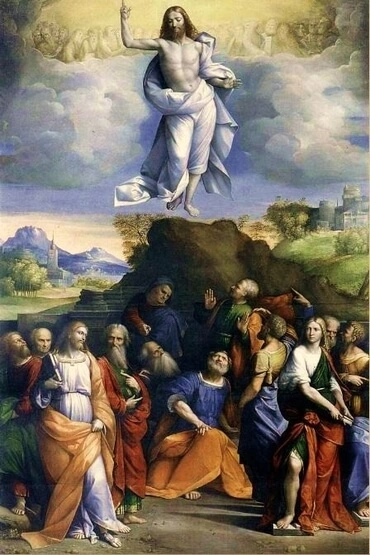Explanation of John 1:14
By Brian David

This is a key moment in this story. The beginning of John 1 explained that the Lord is perfect, infinite love which gave itself expression as divine truth. The duality of love and expression formed a template for humanity, which meant that the Lord’s duality made him the ultimate, divine human. It showed that the divine truth was the power of creation, and that the Lord shared that truth with humanity from the outset, so that people could receive His love and return it. But people kept turning away, and the Lord had to keep expressing his love in more and more external forms to maintain a connection.
By mentioning John the Baptist, the chapter showed that the Jews of the time still had the truth – the Lord’s Word – contained inside the rough-hewn images of the Old Testament. But they were so steeped in evil loves and false thinking that the connection to the Word – to the love within the Old Testament – was about to be snipped forever.
So the Word became flesh. The Lord passed the full expression of His love and His full humanity into physical flesh as Jesus. That way He could once again show the life within the existing Scriptures and could make His own life and His own words part of an expanded expression of truth for a new age of humanity. People could no longer see and feel the Lord’s love through the Old Testament, but they could see and feel it in the face and hands and words of Jesus.
The "glory" here expresses the blinding brilliance of that truth. The "Father" represents the Lord’s actual love itself, and being "begotten" means that the love was expressed in the form of truth. Being full of "truth" has a pretty obvious meaning, but "grace" means an affection, a love for what is true.
The Lord had to come. He had to let His humanity flow down into the flesh, into the most external of forms, because that was the only way we were going to see and embrace it.
(References: A Brief Explanation of the Teachings of the New Church 117; The Apocalypse Explained 1069 [3]; The Word 20; True Christian Religion 3, 85)
Arcana Coelestia #7918
7918. 'And you shall take a bunch of hyssop' means the outward means by which purification is effected. This is clear from the meaning of 'hyssop' as outward truth, the means by which purification is effected, dealt with below. It says that they were to take a bunch of hyssop because 'a bunch' is used to refer to truths and the arrangement of them, 5530, 5881, 7408. The reason why 'hyssop' means outward truth, the means of purification, is that all spiritual purification is effected by means of truths. For the earthly and worldly types of love from which a person has to be purified are not recognized except by means of truths. When these truths are instilled by the Lord a horror of those types of love, as of things unclean and damnable, is also at the same time instilled. The effect this horror has is that when something similar enters the person's thinking the feeling of horror returns, producing a loathing of those types of love. That is how a person is purified by truths, which serve as outward means. This was the reason why it was laid down that knives or 'small swords' made of flint should be used when circumcision took place, 'small swords' or knives made of flint being the truths of faith by means of which purification is effected, see 2799, 7044, and 'circumcision purification from filthy types of love, 2039, 2632, 3412, 3413, 4461, 7045.
[2] Since 'hyssop' had that meaning it was used in cleansings, which in the internal sense meant purifications from falsities and evils, as in the cleansing of leprosy in Moses,
The priest shall take for cleansing a leper two living clean birds, and cedarwood, and scarlet, and hyssop; and he shall dip them in the blood of the slaughtered bird, and sprinkle over the one to be cleansed. Leviticus 14:4-7.
Hyssop was likewise used in the cleansing of the house, if leprosy was in it, Leviticus 14:49-51. The preparation of the water of separation by which cleansings were accomplished also involved the use of cedarwood and hyssop, Numbers 19:6, 18. 'Cedarwood' meant inward spiritual truth, whereas 'hyssop' meant outward [spiritual] truth. Thus 'cedarwood' is the means effecting purification more internally, 'hyssop' the means effecting it more externally. That 'hyssop' is a means of purification is plainly evident in David,
You will purge me with hyssop and I shall become clean; You will wash me and I shall be made whiter than snow. Psalms 51:7.
'Purging with hyssop and becoming clean' stands for external purification, 'washing and being made whiter than snow' for internal purification, 'snow' and 'whiteness' having reference to truth, 3301, 3993, 4007, 5319. 'Hyssop' means a very low kind of truth and 'cedar' a superior kind of truth, as is evident from the following words in the first Book of Kings, Solomon spoke about trees, from the cedar which is in Lebanon even to the hyssop which comes out of the wall. 1 Kings 4:33.
Here 'the cedar' stands for the internal kind of truth and 'hyssop' for the external kind of truth that belong to intelligence.






